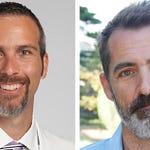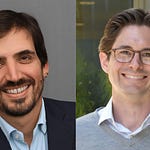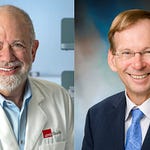Chapters:
0:00 Enhancing vs. engineering immune cells
4:00 How do you “supercharge” the NK cells?
8:20 Positive data from Phase I
13:10 Science involves targeting tau and amyloid proteins
17:18 Hoping to treat patients by 2025
20:42 Biggest challenge?
Our guest today introduced us to a new kind of immunotherapy called Super-NK. Imagine CAR-T, but in this case, the immune cells from the patient are not engineered, but rather “supercharged.” What’s remarkable is that the company is having success with the therapy against neurological conditions such as Alzheimer’s and Parkinson's.
Paul Song is the CEO of NKGen Biotech. The company just presented results from a Phase I trial at the 16th Annual Clinical Trials on Alzheimer’s Disease Conference (CTAD), showing that enhanced killer cells could be an effective treatment against Alzheimer’s. 90% of patients demonstrated improvement or maintained stable cognitive function as per Alzheimer’s disease composite score (ADCOMS) following 11 weeks.
Paul says that the idea of treating neurological disease with the super killer cells is quite novel and came somewhat randomly. They had their sights set on treating cancer.
“It’s by chance that we saw some activity with Alzheimer’s disease. The co-founder’s father, sitting in a nursing home with advanced Alzheimer’s, wanted to know if we were to give him some enhanced NK cells whether that might make his immune system stronger to fend off an infection. It was not to treat any neurological disorder.”
Paul says they were confident that there were no safety issues and decided it was a reasonable thing to treat him. After three or four treatments, the patient was talking to his son where he hadn’t been able to previously.
“Nobody had ever heard of why an NK cell could cause improvement in neurological conditions. There was nothing in the literature.”
Now, with a Phase I trial showing great results, the company is excited to move forward in neuro and hopes to be treating patients by 2025. What is the supercharging process? Does Paul now understand more of the science behind these positive results? And what is the biggest challenge moving forward?
Supercharged Killer Cells Effective Against Alzheimer’s: Paul Song, CEO, NKGen Biotech
Nov 28, 2023
Mendelspod Podcast
Offering a front row seat to the Century of Biology, veteran podcast host Theral Timpson interviews the who's who in genomics and genomic medicine.
Offering a front row seat to the Century of Biology, veteran podcast host Theral Timpson interviews the who's who in genomics and genomic medicine.Listen on
Substack App
RSS Feed
Appears in episode
Recent Episodes











